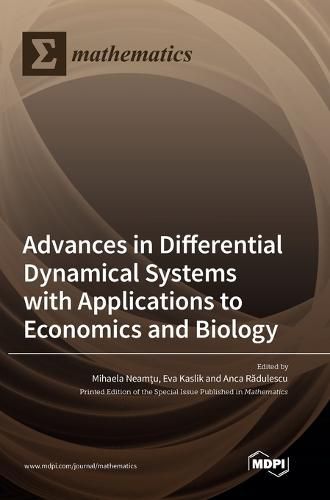Readings Newsletter
Become a Readings Member to make your shopping experience even easier.
Sign in or sign up for free!
You’re not far away from qualifying for FREE standard shipping within Australia
You’ve qualified for FREE standard shipping within Australia
The cart is loading…






This title is printed to order. This book may have been self-published. If so, we cannot guarantee the quality of the content. In the main most books will have gone through the editing process however some may not. We therefore suggest that you be aware of this before ordering this book. If in doubt check either the author or publisher’s details as we are unable to accept any returns unless they are faulty. Please contact us if you have any questions.
In recent research on natural processes, mathematical modeling has become a very useful tool. It is often the case that, in fields such as economics and biology, a temporal lag between cause and effect must often be taken into consideration. In modeling, a natural and practical implementation of this phenomenon is through the use of distributed delays. This is because they illustrate the situation where temporal lags arise in certain ranges of values for certain related probability distributions, taking into account the variables' entire history of behavior. Another mathematical tool that allows for the memory and inherited properties of systems to be encompassed in a model is the replacement of integer-order derivatives with fractional derivatives. To address realistic conditions, stochastic perturbation framed by a stochastic differential delay system can be used to explain the ambiguity about the context in which the system operates. The present book comprises all the 16 articles accepted and published in the Special Issue "Advances in Differential Dynamical Systems with Applications to Economics and Biology" of the MDPI journal Mathematics, with focuses on the dynamical analysis of mathematical models, arising from economy and biology, and innovative developments in mathematical techniques for their applications. We expect that the international scientific community will find this collection of research papers influential and that they will spur additional investigations on diverse applications with respect to dynamical systems in all scientific areas.
$9.00 standard shipping within Australia
FREE standard shipping within Australia for orders over $100.00
Express & International shipping calculated at checkout
This title is printed to order. This book may have been self-published. If so, we cannot guarantee the quality of the content. In the main most books will have gone through the editing process however some may not. We therefore suggest that you be aware of this before ordering this book. If in doubt check either the author or publisher’s details as we are unable to accept any returns unless they are faulty. Please contact us if you have any questions.
In recent research on natural processes, mathematical modeling has become a very useful tool. It is often the case that, in fields such as economics and biology, a temporal lag between cause and effect must often be taken into consideration. In modeling, a natural and practical implementation of this phenomenon is through the use of distributed delays. This is because they illustrate the situation where temporal lags arise in certain ranges of values for certain related probability distributions, taking into account the variables' entire history of behavior. Another mathematical tool that allows for the memory and inherited properties of systems to be encompassed in a model is the replacement of integer-order derivatives with fractional derivatives. To address realistic conditions, stochastic perturbation framed by a stochastic differential delay system can be used to explain the ambiguity about the context in which the system operates. The present book comprises all the 16 articles accepted and published in the Special Issue "Advances in Differential Dynamical Systems with Applications to Economics and Biology" of the MDPI journal Mathematics, with focuses on the dynamical analysis of mathematical models, arising from economy and biology, and innovative developments in mathematical techniques for their applications. We expect that the international scientific community will find this collection of research papers influential and that they will spur additional investigations on diverse applications with respect to dynamical systems in all scientific areas.